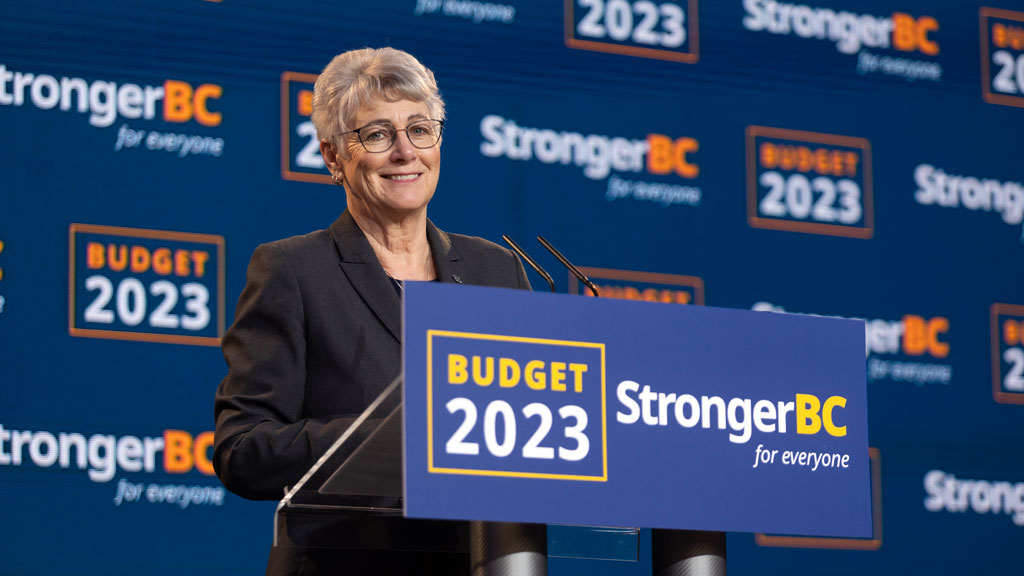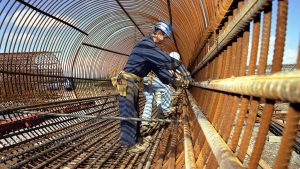Construction stakeholders in British Columbia are torn between celebrating a historic investment in infrastructure and criticizing the lack of movement on major issues like prompt payment and the supply chain in the 2023 budget.
“It feels like it should have been a lot better than it was. You have record investment in infrastructure and housing,” said Jordan Bateman, VP of communications and marketing with the Independent Contractors and Businesses Association of B.C.
“Nothing was resolved on the long-term problems facing the industry,” he said.
On February 28, the Government of British Columbia released its 2023 budget. The budget features historic infrastructure investments at $37.5 billion over three years, a historic $4.2 billion investment in affordable housing building and the largest ever capital investment in health care infrastructure at $11.2 billion.
But perhaps what stood out most for stakeholders was what the budget did not contain.
The 2023 budget commits $480 million over three years to support Future Ready, the province’s skills training and labour plan. But there are few details as to how the money will be spent with the full plan scheduled to be released in the spring.
Brynn Bourke, executive director of BC Building Trades, said she was disappointed there was no direct investment in SkilledTradesBC in the budget to create more apprenticeship seats.
“There isn’t the increase that we had hoped to see,” Bourke told the Journal of Commerce.
In a news release, the Province writes that Future Ready will include a new grant for short-term skills training, funding for small and medium sized businesses to find and implement labour solutions, opportunities for Indigenous people and the creation of thousands of new training seats.
“But we don’t have any details,” said Bourke, “We know that we need to invest in the skilled trades. We need sustainable funding to recruit new entrants into our system, to train them, to cover the costs of inflation and escalating equipment costs.”
Matt MacInnis, president of the Electrical Contractors Association of B.C., expressed concern Future Ready wouldn’t provide enough new training seats for the construction industry and would instead favour tech, a concern Bateman shared.
“There isn’t a clear commitment specifically to address the looming shortage of electrical workers,” MacInnis said.
“We need to realize that the people who are actually building the infrastructure which will enable BC to achieve its climate objectives need to be part of that future skills plan as well,” he said.
The British Columbia Construction Association highlighted the lack of commitment to address prompt payment legislation as a major failing.
“Non-payment and late payment is out of control, right alongside skyrocketing interest rates, cost of materials, and cost of labour,” the BCCA said in a news release.
“The single biggest thing BC’s government can do for its 25,000 small and medium construction businesses is provide prompt payment legislation so that they will be reliably paid for the public and private projects they are called to build. No amount of infrastructure investment will succeed if we don’t reduce the pressures on BC’s builders.”
MacInnis said he was pleased with the infrastructure investments made by the Province and said he hopes the $6 million set aside for a critical mineral strategy could bring more private investment into the province.
But investments mean little without the workers to get the job done.
“At the end of the day, if you don’t have the skilled labour it doesn’t matter if there’s money available or what the targets are. If there isn’t enough people to build it, it won’t get done.”
Kelly Scott, president of the BC Road Builders and Heavy Construction Association, was enthusiastic about the budget.
“We’re quite pumped by what we’re seeing. We have continued investment in infrastructure, continued investment in British Columbia and rebuilding it better in light of the atmospheric rivers and heat domes we had a couple of years ago,” Scott said in an interview.
Scott noted his organization has no issue with labour as several huge projects are starting to wrap up such as the Pattullo Bridge replacement, Kicking Horse Canyon work on the Trans Canada and Site C.
“We’re expecting to see 7,000 to 10,000 workers available for projects around British Columbia as a result of all that work ending,” he said.
Paul de Jong, president of the Progressive Contractors Association of Canada, said the lack of any change to the Province’s community benefits agreement is a sore oversight.
“The importance of the government recognizing the roles and needs of broader industry is sadly undermined in this budget, which could in funding and programming go much farther if it had signaled the end of its massively wasteful and poorly consulted Community Benefits Agreement,” de Jong told the Journal of Commerce.
“Dollars wasted in this failed attempt at social procurement could have gone a great deal further in supporting employers and their employees in pursuit of much needed skills training, upskilling, recruitment, and parity of esteem initiatives.”
Bourke was supportive of the $12 million investment in Employment Standards over three years and the $867 million investment in mental health supports, noting the health investment could create a strategy for dealing with addiction in construction.
Bourke singled out the Province’s commitment to make contraception free for B.C. residents as a significant move.
“I’m very proud that British Columbia is the first province to offer it. I think it’s long overdue. I think it’s not just the woman’s issue, it’s a workers issue.”
Dr. David Baspaly, president and CEO of the Council of Construction Associations, felt the budget showed the Provincial Government was focusing on the right issues through infrastructure and labour investments, noting budgets tend to forecast priorities more than they put forth new policy.
“If it impacts our members and it is good for the economy and helps build BC strong then we want to see it happen. There’s certainly nothing in here that makes my head spin,” Baspaly said.
He said he was optimistic around the Future Ready plan but as with other stakeholders was hoping to see more details on the plan in the budget.
“We really do need this. It’s an issue that we should have been dealing with years and years ago,” he said, “But it’s a step in the right direction.”











Recent Comments
comments for this post are closed